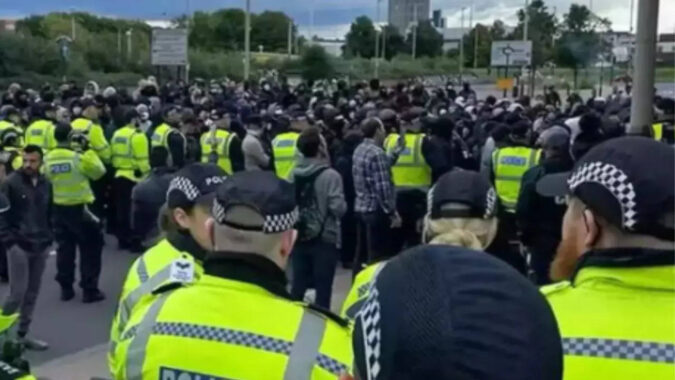Anti-blasphemy laws still exist in many countries, most notably in Pakistan where blasphemy can be punishable by death. However, blasphemy laws were abolished in England and Wales in 2008.
The Henry Jackson Society has identified “extreme anti-blasphemy action” as a growing risk to the tenets of the UK’s liberal democratic system, including freedom of speech and freedom of religion.
The report “Britain’s New Blasphemy Police? Understanding Islamist Anti-Blasphemy Action in the UK” found that some individuals and organisations in the UK, especially those with links to Pakistan, particularly to the Sunni Barelvi sect, hold extreme anti-blasphemous views and are prepared to resort to violence to defend Islam.
“Two organisations found to be frequently linked to anti-blasphemy action in the UK are Tehreek-e-Labbaik Pakistan (TLP) and elements of the Khatme Nabuwwat movement,” the report said, pointing out anti-blasphemy preachers from Pakistan and Bangladesh have been allowed to preach in Britain at institutions linked to anti-blasphemy action.
It calls for the UK government to consider proscribing certain organisations in Pakistan and Bangladesh.
The report, written by Charlotte Littlewood, refers to the incident in Batley in 2021 where a teacher was suspended and forced into hiding over a caricature; the incident in Wakefield where a 14-year-old autistic non-Muslim boy dropped the Quran and got suspended from school and his family received death threats, leading his mother to vow to make her son research Islam; the film “Lady of Heaven” which was cancelled by cinemas following large-scale protests by Muslims; a book, “The Jewel of Medina”, that got pulled because of threats to the publishing house; and the murder of Ahmadiyya Muslim Asad Shah in Glasgow in 2016.
The report criticises “some local councillors’” responses to anti-blasphemy incidents, saying “they have at times seemingly supported the anti-blasphemy action taken”.
It calls for more robust immigration screening on preachers, for an investigation into the instigators of the protests in Batley and Wakefield to identify links to extremists abroad, and for the department of education to “prioritise the safety of staff and pupils and the ability to teach without censorship”.
“Accepting a tacit anti-blasphemy law is antithetical to our democratic values whilst also a threat to national security,” the report concludes.
